digestive support
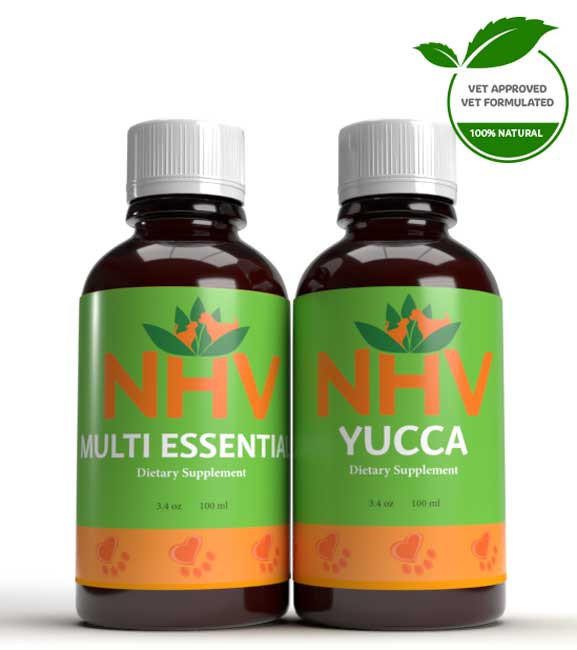
free shipping over $100 (USA & Canada)
1-877-937-4372 the pet expert hotline
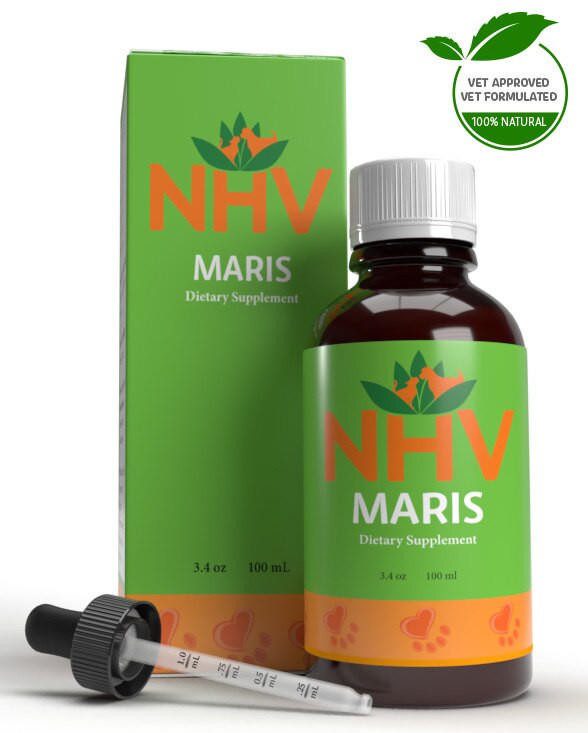
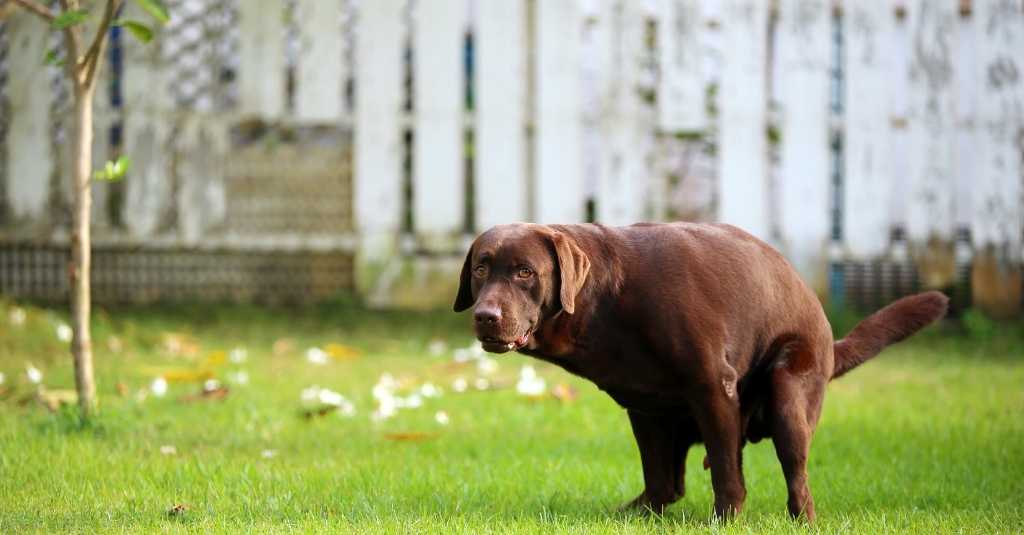
Constipation, diarrhea, and vomiting are symptoms most pet parents are terrified of. Being worried is a common gut reaction, however, sometimes these symptoms are normal and will resolve themselves. This article will explain when these symptoms are normal when you should bring them to the vet, and what you can do to help.
Constipation is a term used to describe the absent or difficult passage of stools. Many factors can lead to constipation, and when it occurs, stools are retained longer than normal in the intestines. This is because the intestines can absorb water from the stools, and the more time they are stuck in this region, the dryer and harder they get.
Constipated animals can present signs of discomfort when trying to defecate and this may be accompanied by excessive straining, vocalization, and shifts in the behavior.
Here are a couple of factors that can cause constipation:
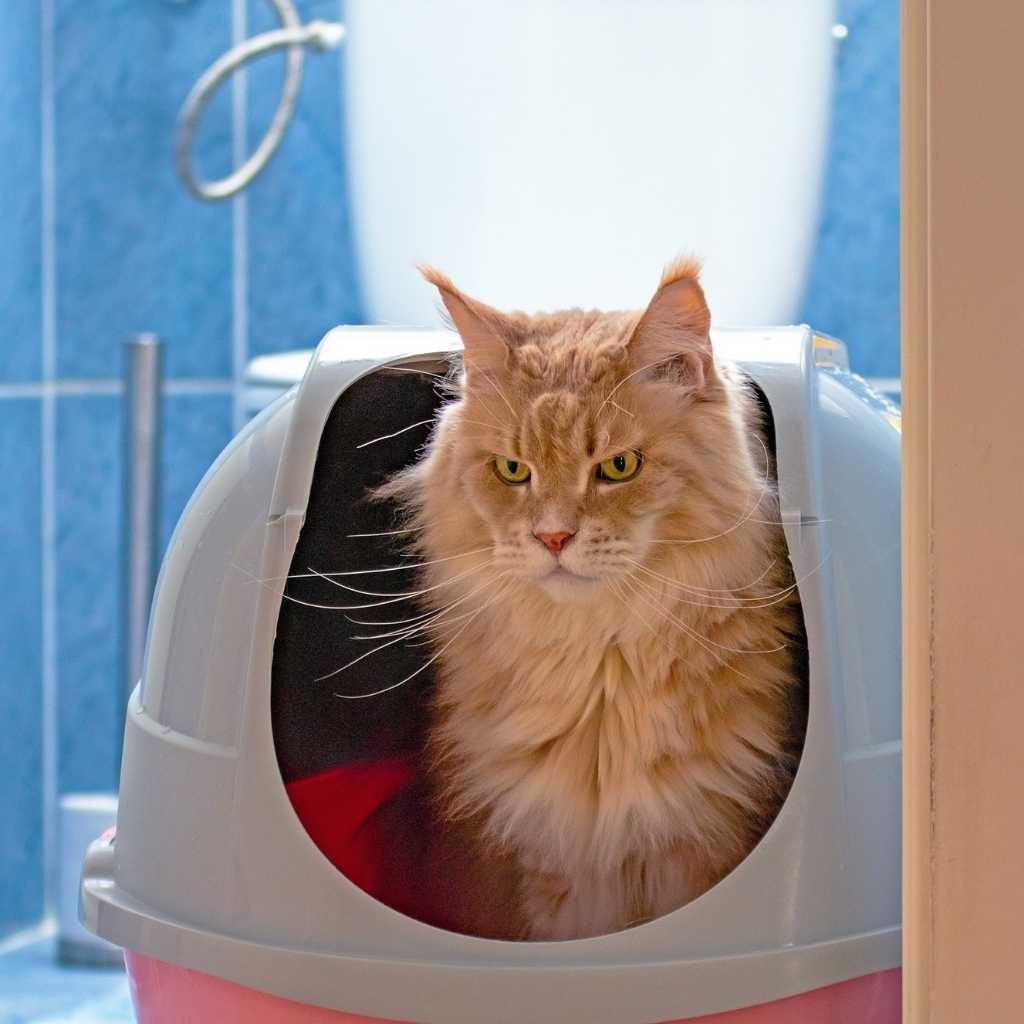
Cats can be even more sensitive to constipation because, besides all the elements mentioned above, it can be caused by problems with the litter box. Factors like the location of the litter box in a noisy or unpleasant place, when the amount of litter trays is not enough for the number of kitties in the house leading to fights if it’s dirty if the cat doesn’t like the type of litter if kitty finds a hard time to access it for any reason if the cat had a bad experience when using a litter box, etc. all can contribute for constipation in a cat as well.
If your pet has been showing signs of constipation for more than two days, you should take your pet to be seen by a veterinarian.
Besides straining and uncomfortable or difficult defecation, if you realize your pet shows signs like hard, dry small stools, lethargy, loss of appetite, hunched posture, and/or vomiting for more than two days you should consider taking your little one to see a veterinarian. The vet may have to do a number of investigations and examine your cat and talk with you about what has been going on. The vet will be able to check the consistency of the stools through a physical examination and get an idea of how advanced the constipation is. Further exams like lab tests, endoscopy, and image exams like X-rays and ultrasounds might be required to better understand and rule out other conditions like tumors in the gastrointestinal tract. Musculoskeletal conditions, neurological conditions, and diseases in the urinary tract also need to be ruled out since they can be the primary causes of constipation.
Constipation is a very serious symptom, and it is important to keep in mind that chronic constipation can lead to more complicated outcomes such as obstipation and megacolon. Obstipation happens when fecal matter becomes chronically compacted and the pet cannot defecate at all. Megacolon happens when the colon loses its normal motility and ability to contract and push feces towards the rectum. Obstipation and megacolon are very complicated cases to manage only with medications only and surgery may be required in some cases.
The treatment for constipation will depend on the underlying cause of the problem, its severity and its duration.
For cats, litter box management is essential. The location, number of trays, type of litter, and the frequency you clean it and replace the litter is also important since this may encourage or discourage your kitty to use it.
Constipation is a very serious symptom and it is important to keep in mind that chronic constipation can lead to more complicated outcomes such as obstipation and megacolon.
Depending on the case, a diet with a higher amount of fiber can be recommended. Besides other benefits, fibers can increase fatty acid production, which helps with bowel movements. However, your vet will be able to advise you on a good diet or dietary supplement.
To increase water consumption should be considered either through easy access to clean bowls of freshwater, a higher moisture content diet, and/ or subcutaneous fluids, depending on the case. Enemas and laxative drugs can also be recommended and for extreme cases like obstipation and megacolon, surgery may be required. The veterinarian will advise you on this matter.
NHV has excellent support for constipation and discomfort. Maris is a balanced formula to help promote healthy bowel movements. Maris helps soothe your pet’s intestines, promotes softer stools, and helps relieve cramps and gas. It contains Cascara Sagrada which is a natural laxative that restores intestinal tone and muscle activity without cramping. Since our supplements are all-natural, they can take a couple of weeks until you start seeing the results, so for immediate emergency relief of constipation, we strongly encourage you to see your vet.
Vomiting in pets is another condition that can indicate that something is wrong with our little ones. Vomiting is an active process controlled by the brain, and it happens when there’s a forceful ejection of the content of the stomach and upper small intestine. Normally, its content can be partially digested, and a yellow fluid (bile) may be present.
Vomiting is also preceded by other signs, such as nausea, excessive drooling, retching, and contractions of the abdomen and diaphragm and the severe effort associated with vomiting may be distressing to the pet.
Vomiting can be caused by many different disorders and from varying levels of severity such as conditions in the digestive system, urinary tract conditions, liver failure, food allergies, pancreatitis, nervous system disorders, internal parasites, infections, inflammation, drugs, ingestion of irritating substances, poisons, foreign objects, and tumors. Occasional vomiting can be quite common in pets and can be caused by factors such as hairballs and minor intestinal upset, for instance.
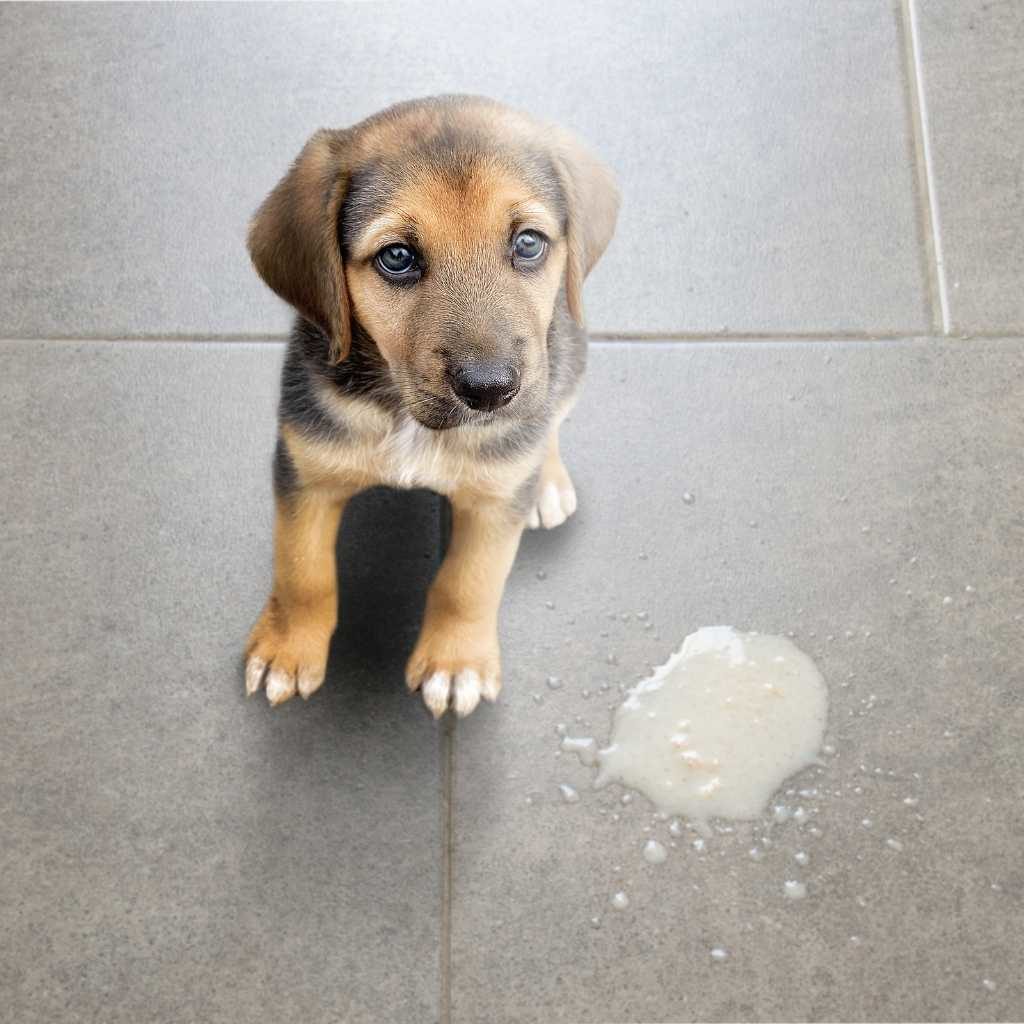
It’s important to differentiate vomiting from regurgitation when you’re taking your little one to the veterinarian since their causes are different. Regurgitation is a passive motion, and it relatively does not require effort or contraction of the abdominal muscles. Normally the regurgitated content has a tubular shape (the shape of the esophagus), and since it occurs right after eating or drinking, the expelled content tends to be undigested.
If the vomiting has not stopped within a day or two, you should consider taking your furbaby to the veterinarian.
Many cases of acute vomiting will improve on their own without any intervention within 24 hours. If it has not stopped within a day or two, you should consider taking your fur baby to the veterinarian. Vomiting can become a problem because it can quickly lead to severe dehydration and nutrient loss. Long-term vomiting can also be accompanied by blood, discomfort, lethargy, loss of appetite, fever, and other adverse signs which may require urgent care.
The vet will investigate the main cause of vomiting while allowing the digestive system time to recover with supportive treatments. The veterinarian will ask for a detailed history of what’s going on and will perform a physical examination. The vet may also ask for blood, fecal, and urine samples as well as x-rays, ultrasonography, and endoscopy. Sometimes a biopsy of the stomach and/ or small intestines can be helpful to determine what’s causing it.
Once the diagnosis is known, more specific treatment may include special medications, changes in the diet, or even surgery. Depending on what’s causing vomiting in your pet, different supplements can help.
Great support for cases of vomiting is NHV’s Digestion kit. This kit comes with Multi Essentials and Yucca.
Multi Essentials helps aid effective digestion, provides added support for pets exposed to environmental toxins, and helps to fill nutritional voids due to poor diet or illness.
Yucca contains two powerful compounds: sarsasapogenin and smilagenin. These compounds work on the mucous membranes of the small intestines helping with the penetration and absorption of minerals and vitamins. Sarsasapogenin and smilagenin are known as steroidal saponins (phytosterols) which act as precursors to corticosteroids produced naturally by the body. Steroidal saponins support the immune function of the body while stimulating and supporting the production of its own corticosteroids and corticosteroid–related hormones. Due to this action, studies conducted on Yucca have shown that it may be beneficial and effective for discomfort and inflammation in conditions such as imbalances in the gastrointestinal tract. Yucca may also be a natural appetite stimulant and may help reduce the production of urease, which contributes to the unpleasant odors of urine and feces in some pets.
Normal stools in pets are commonly brownish in color and well-formed. If a pet is suffering from diarrhea, the fecal consistency changes to soft, liquid, and can even become watery. The color can also become lighter or darker than normal and signs such as fresh blood or mucus in the feces can also appear as well as the loss of appetite and lethargy.
Diarrhea can be caused by primary conditions in the intestines or conditions of organs outside the gastrointestinal tract and some of the causes can be:
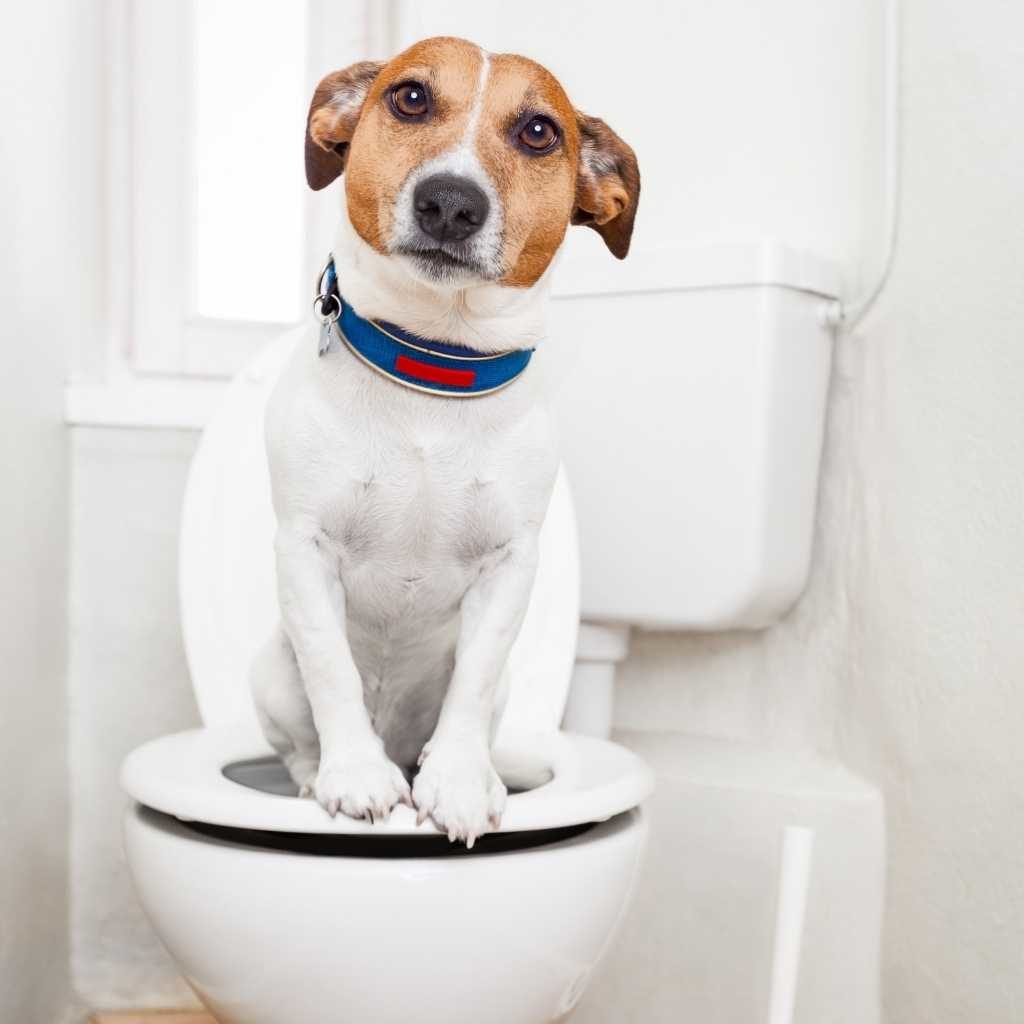
In case you have a pet with access to the outdoors and you are not sure if they are presenting diarrhea, staining and soiling of the fur around the back end, especially in longhaired breeds, is often associated with this symptom.
In case the diarrhea is severe and/or if it persists for more than two days, you should consider taking your little one to the veterinarian.
In case the diarrhea is severe and/or if it persists for more than two days, you should consider taking your little one to the veterinarian. Dogs and cats with chronic diarrhea will lose weight because they cannot absorb nutrients properly and may also develop edema in the legs, belly, or chest due to the loss of albumin in diarrhea. This protein helps to keep water in the blood vessels and when its levels are low, water starts to leak out of blood vessels to accumulate in other locations. Chronic diarrhea can also cause the fur to look dull and brittle due to nutrient deficiencies.
The veterinarian will perform a thorough clinical exam and may ask for a sample of fresh stools. She may recommend additional diagnostic tests like blood work, stool, and rectal swab samples for parasite examination, DNA testing, and culture, radiographs (X-rays), ultrasound of the abdomen, and endoscope exam as well. Small biopsies of the lining of the intestines can be taken for microscopic evaluation if needed.
The treatment of diarrhea will depend on the specific diagnosis. Non-specific treatment often includes a high fiber diet, an anti-inflammatory drug, and fluid reposition. The veterinarian will also advise you on how to reintroduce food and water to your pet’s regimen depending on the severity of the case.
Since diarrhea involves some degree of inflammation of one or more areas of the gastrointestinal tract, a supplement that repairs the lining of the intestines can provide great support for this condition.
Our main support for diarrhea is Plantaeris. Plantaeris is a gentle, natural, vet-formulated supplement to help with diarrhea. It is designed to help reduce symptoms of diarrhea and promote normal bowel function. It also helps soothe and relieve spasms, and discomfort.
On the other hand, TumFlora, is our main supplement for IBD and overall gastrointestinal health. TumFlora can also help to improve natural intestinal flora while helping to reduce discomfort.
Another great support for this symptom is Inulin-PK. Besides being a natural dewormer, NHV Inulin-PK is designed to help control parasites, encourage intestinal bleeding to stop, and promote repair of the internal damage in the gastrointestinal tract. One of the herbs in this formula is Oregon Grape, which helps relieve indigestion, malabsorption, and has antibiotic and immunostimulatory properties.
Last but definitely not least, our newest supplement, NHV Probiotic & Prebiotic, can help encourage a healthy gut flora, ease digestive discomfort, and alleviate gut issues, including diarrhea, constipation, and vomiting!
We are always here to help and guide you whenever you need us. You can reach out to our team of pet experts at any time in case you have any questions about how our supplements can help your little one with gastrointestinal disorders.
digestive support

Yucca & Multi Essentials
bundle and save with pet expert kits
3 month supply for a small to medium size pet.
Just like humans, as our furkiddos age, their body may not be as good at breaking down food and absorbing vital nutrients. NHV’s Digestion Kit is a comprehensive bundle that helps to soothe inflammation, encourage better absorption, and stimulate metabolism.

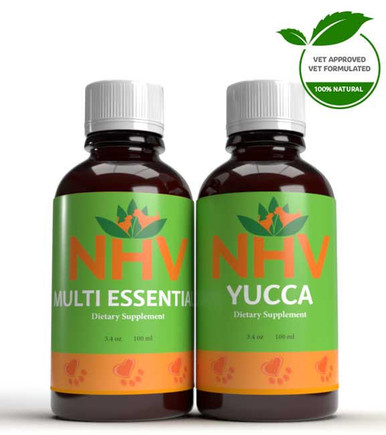
Just like humans, as our furkiddos age, their body may not be as good at breaking down food and absorbing vital nutrients. NHV’s Digestion Kit is a comprehensive bundle that helps to soothe inflammation, encourage better absorption, and stimulate metabolism.

Regardless of your furkiddo’s age, it’s never easy to see them slowing down and having difficulties with their health. If your furry friend is having a tough time with their digestion, then they may not be able to break down and absorb all of the nutrients necessary for maintaining healthy skin, fur and overall health. Our Digestion Kit is formulated to help fill nutritional voids, improve absorption and overall gastrointestinal health.
Just like humans, as our pets age, they may be a little less energetic. That's totally normal! We all require different levels of support at different stages in our lives. Our Digestion Kit contains Yucca, and Multi Essentials, which is a supplement bundle designed to help our pets better absorb nutrients and trigger metabolism. Yucca contains a high level of antioxidant properties that are beneficial for promoting healthy appetite and improving absorption. When it comes to cat sensitive stomach and gastrointestinal dog care, the herbs in Multi Essentials provide many key vitamins and minerals for building and maintaining healthy GI tract health, promoting healthy metabolism, and helping to reduce fatigue. Ingredients like chickweed and dandelion are effective digestive tonics that may help to enhance absorption while herbs like Oregon grape help to reduce indigestion and malabsorption.
It’s great to know that there are ways to support your furkiddo’s digestion naturally! Other than adding natural supports to their daily meals, if you’re wondering about options for gastrointestinal dog care and cat care, a personalized diet for your pet, created by Dr. Amanda, is another great way to support your furry friend!
Made with the finest, organically grown, or ethically harvested herbs. Made specifically for pets, vet-formulated, and vet approved.
Multi Essentials
Select your pet's weight to determine the correct dose.
To be taken twice daily. Determine your pet’s weight and then use the easy chart below to determine the correct dose. This is the minimum dosage.
Pet's Weight Dosage
0 - 15 lb = 0.5 ml
16 - 30 lb = 1.0 ml
31 - 45 lb = 1.5 ml
46 - 60 lb = 2.0 ml
61 - 75 lb = 2.5 ml
Over 75 lb = 3.0 ml
How to Administer
Shake well before use. The easiest method is to use the dropper provided and place the drops into your pet’s food or favorite treat. You can also use the dropper and squirt directly into the pet’s mouth. Some pets can be finicky, if this occurs consider hiding the drops in foods most pet’s love such as fish, chicken or yogurt or a favorite treat. If your pet only eats dry food then soak a few kibbles at feeding time.
For Best Results
Herbal dietary supplements are beneficial to the health and well-being of your pet and are safe for long-term use. Every pet responds to natural herbal supplements differently, therefore it is important to be consistent and administer the product daily. Supplements generally take two to four weeks to take effect, however this will vary from one animal to the next.
Product Storage
All NHV Natural Pet Products are pure herbal extracts and contain no artificial additives, preservatives or coloring. Shelf life after opening is 6 months and must be refrigerated after opening.
All information provided by NHV Natural Pet Products is for educational purposes only.
Regardless of your furkiddo’s age, it’s never easy to see them slowing down and having difficulties with their health. If your furry friend is having a tough time with their digestion, then they may not be able to break down and absorb all of the nutrients necessary for maintaining healthy skin, fur and overall health. Our Digestion Kit is formulated to help fill nutritional voids, improve absorption and overall gastrointestinal health.
Just like humans, as our pets age, they may be a little less energetic. That's totally normal! We all require different levels of support at different stages in our lives. Our Digestion Kit contains Yucca, and Multi Essentials, which is a supplement bundle designed to help our pets better absorb nutrients and trigger metabolism. Yucca contains a high level of antioxidant properties that are beneficial for promoting healthy appetite and improving absorption. When it comes to cat sensitive stomach and gastrointestinal dog care, the herbs in Multi Essentials provide many key vitamins and minerals for building and maintaining healthy GI tract health, promoting healthy metabolism, and helping to reduce fatigue. Ingredients like chickweed and dandelion are effective digestive tonics that may help to enhance absorption while herbs like Oregon grape help to reduce indigestion and malabsorption.
It’s great to know that there are ways to support your furkiddo’s digestion naturally! Other than adding natural supports to their daily meals, if you’re wondering about options for gastrointestinal dog care and cat care, a personalized diet for your pet, created by Dr. Amanda, is another great way to support your furry friend!
Made with the finest, organically grown, or ethically harvested herbs. Made specifically for pets, vet-formulated, and vet approved.
Multi Essentials
Select your pet's weight to determine the correct dose.
To be taken twice daily. Determine your pet’s weight and then use the easy chart below to determine the correct dose. This is the minimum dosage.
Pet's Weight Dosage
0 - 15 lb = 0.5 ml
16 - 30 lb = 1.0 ml
31 - 45 lb = 1.5 ml
46 - 60 lb = 2.0 ml
61 - 75 lb = 2.5 ml
Over 75 lb = 3.0 ml
How to Administer
Shake well before use. The easiest method is to use the dropper provided and place the drops into your pet’s food or favorite treat. You can also use the dropper and squirt directly into the pet’s mouth. Some pets can be finicky, if this occurs consider hiding the drops in foods most pet’s love such as fish, chicken or yogurt or a favorite treat. If your pet only eats dry food then soak a few kibbles at feeding time.
For Best Results
Herbal dietary supplements are beneficial to the health and well-being of your pet and are safe for long-term use. Every pet responds to natural herbal supplements differently, therefore it is important to be consistent and administer the product daily. Supplements generally take two to four weeks to take effect, however this will vary from one animal to the next.
Product Storage
All NHV Natural Pet Products are pure herbal extracts and contain no artificial additives, preservatives or coloring. Shelf life after opening is 6 months and must be refrigerated after opening.
All information provided by NHV Natural Pet Products is for educational purposes only.
diarrhea support
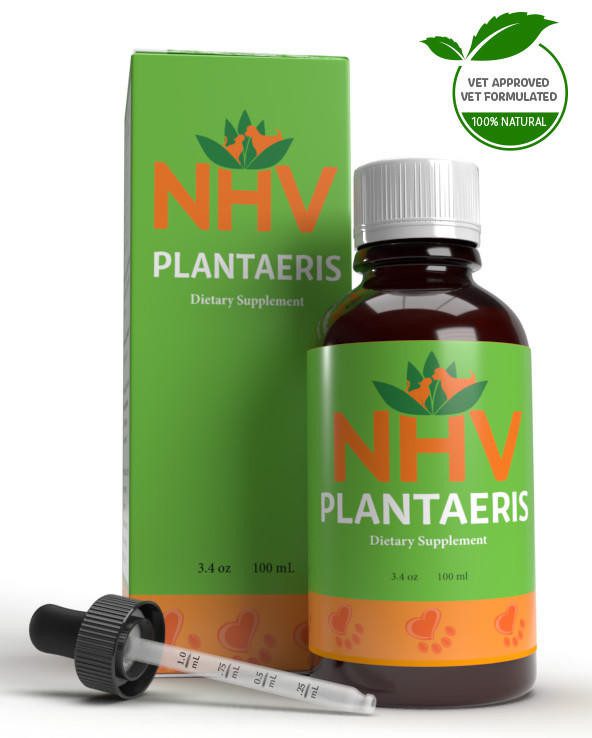
Natural relief to help your cat’s diarrhea and inflammatory bowel syndrome (IBS)
buy 2 and save $3
3 month supply for a small to medium size pet
Does your cat have diarrhea or loose stools? NHV Plantaeris is a natural vet-formulated supplement designed to gently help support normal bowel functions, while soothing and relieving spasms of the digestive tract.

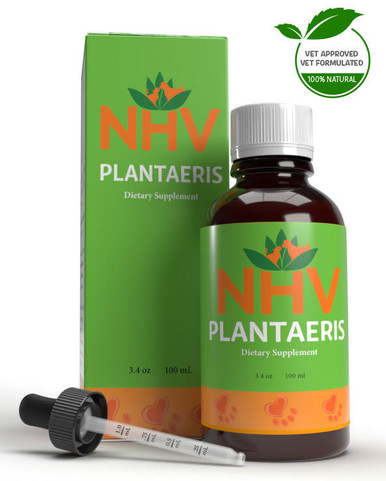
Does your cat have diarrhea or loose stools? NHV Plantaeris is a natural vet-formulated supplement designed to gently help support normal bowel functions, while soothing and relieving spasms of the digestive tract.

Plantaeris is a gentle, natural vet-formulated supplement to help cat diarrhea. It is designed to help reduce symptoms of diarrhea and maintain normal bowel function. It also helps soothe and relieve spasms, and discomfort. Since this herbal formulation helps balance the body, it can be used on a longer-term basis if your cat suffers from frequent diarrhea (though it is vital to understand the underlying cause of diarrhea).
Diarrhea is a symptom of digestive disorders. In cats, it can be caused by inflammatory bowel disease, food allergies, parasites, or commonly an underlying condition, such as hyperthyroidism or kidney disease.
To help with cat diarrhea, make sure your pet is getting adequate water and nutrition as diarrhea can lead to weight loss, dehydration, vomiting, and lethargy. Remember that a cat can be eating the same food for years and still develop a food allergy to it. Talk to your vet to rule out any underlying conditions.
For days when your cat is suffering from acute diarrhea, the Plantaeris dosage may be safely doubled. You can then bring down the dosage to normal after the episode has passed. Try adding a bit of pumpkin to their diet to help bulk up stools.
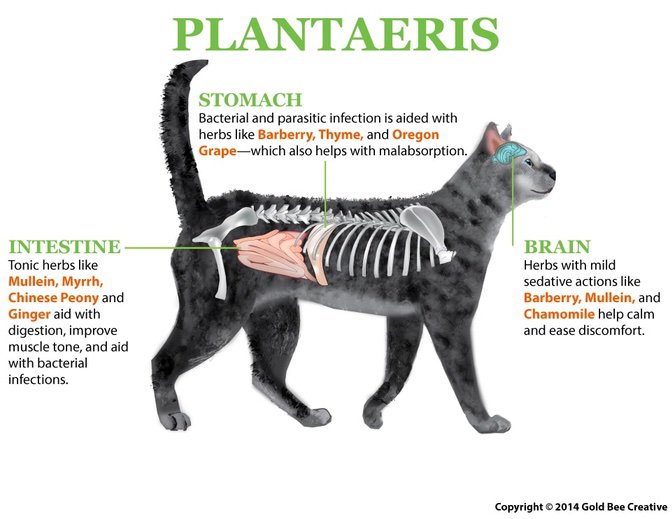
Barberry – Has traditionally been used to treat diarrhea, relieve stomach upset, and to reduce stomach acid.
Mullein – Soothes and lubricates tissues. Mullein’s medicinal properties help fight diarrhea-causing bacteria.
Bayberry – Contains tannins, resins, and gums that control bacterial infection.
Myrrh – Relieves spasms, inflammation, and digestive discomfort.
Thyme – Improves digestion and relaxes spasms. Thyme has traditionally been used to help expel gas, expel worms, and to help with IBD and colitis.
Chamomile – Relaxes the digestive system. It helps expel gas and helps reduce vomiting caused by IBD and is helpful with indigestion.
Chinese Peony – Reduces inflammation and relaxes spasms.
Ginger – Relieves discomfort and stimulates circulation. The enzymes in ginger encourage the production of gastric juices required for digestion. It helps reduce muscle contractions of the bowel, which helps eliminate waste without causing discomfort.
Oregon Grape – Helps relieve indigestion and malabsorption.
Select your pet's weight to determine the correct dose.
To be taken twice daily. Determine your pet’s weight and then use the easy chart below to determine the correct dose. This is the minimum dosage.
Pet's Weight Dosage
0 - 15 lb = 0.5 ml
16 - 30 lb = 1.0 ml
31 - 45 lb = 1.5 ml
46 - 60 lb = 2.0 ml
61 - 75 lb = 2.5 ml
Over 75 lb = 3.0 ml
How to Administer
Shake well before use. The easiest method is to use the dropper provided and place the drops into your pet’s food or favorite treat. You can also use the dropper and squirt directly into the pet’s mouth.
Some pets can be finicky. If this occurs consider hiding the drops in foods most pets love, such as fish, chicken, yogurt or a favorite treat. If your pet only eats dry food then soak a few kibbles at feeding time.
For Best Results
Herbal dietary supplements are beneficial to the health and wellbeing of your pet and are safe for long-term use. Every pet responds to natural herbal supplements differently, therefore it is important to be consistent and administer the product daily. Supplements generally take two to four weeks to take effect; however, this will vary from one animal to the next.
Product Storage
All NHV Natural Pet Products are pure herbal extracts and contain no artificial additives, preservatives or coloring. Shelf life after opening is 6 months and products must be refrigerated after opening.
Cautions and Contraindications
Do not use Plantaeris in pregnant or nursing animals. Speak to your vet before using our products. A second visit is recommended if your pet’s condition does not improve, or deteriorates after continued use of the supplements.
All information provided by NHV Natural Pet Products is for educational purposes only.
Plantaeris is a gentle, natural vet-formulated supplement to help cat diarrhea. It is designed to help reduce symptoms of diarrhea and maintain normal bowel function. It also helps soothe and relieve spasms, and discomfort. Since this herbal formulation helps balance the body, it can be used on a longer-term basis if your cat suffers from frequent diarrhea (though it is vital to understand the underlying cause of diarrhea).
Diarrhea is a symptom of digestive disorders. In cats, it can be caused by inflammatory bowel disease, food allergies, parasites, or commonly an underlying condition, such as hyperthyroidism or kidney disease.
To help with cat diarrhea, make sure your pet is getting adequate water and nutrition as diarrhea can lead to weight loss, dehydration, vomiting, and lethargy. Remember that a cat can be eating the same food for years and still develop a food allergy to it. Talk to your vet to rule out any underlying conditions.
For days when your cat is suffering from acute diarrhea, the Plantaeris dosage may be safely doubled. You can then bring down the dosage to normal after the episode has passed. Try adding a bit of pumpkin to their diet to help bulk up stools.

Barberry – Has traditionally been used to treat diarrhea, relieve stomach upset, and to reduce stomach acid.
Mullein – Soothes and lubricates tissues. Mullein’s medicinal properties help fight diarrhea-causing bacteria.
Bayberry – Contains tannins, resins, and gums that control bacterial infection.
Myrrh – Relieves spasms, inflammation, and digestive discomfort.
Thyme – Improves digestion and relaxes spasms. Thyme has traditionally been used to help expel gas, expel worms, and to help with IBD and colitis.
Chamomile – Relaxes the digestive system. It helps expel gas and helps reduce vomiting caused by IBD and is helpful with indigestion.
Chinese Peony – Reduces inflammation and relaxes spasms.
Ginger – Relieves discomfort and stimulates circulation. The enzymes in ginger encourage the production of gastric juices required for digestion. It helps reduce muscle contractions of the bowel, which helps eliminate waste without causing discomfort.
Oregon Grape – Helps relieve indigestion and malabsorption.
Select your pet's weight to determine the correct dose.
To be taken twice daily. Determine your pet’s weight and then use the easy chart below to determine the correct dose. This is the minimum dosage.
Pet's Weight Dosage
0 - 15 lb = 0.5 ml
16 - 30 lb = 1.0 ml
31 - 45 lb = 1.5 ml
46 - 60 lb = 2.0 ml
61 - 75 lb = 2.5 ml
Over 75 lb = 3.0 ml
How to Administer
Shake well before use. The easiest method is to use the dropper provided and place the drops into your pet’s food or favorite treat. You can also use the dropper and squirt directly into the pet’s mouth.
Some pets can be finicky. If this occurs consider hiding the drops in foods most pets love, such as fish, chicken, yogurt or a favorite treat. If your pet only eats dry food then soak a few kibbles at feeding time.
For Best Results
Herbal dietary supplements are beneficial to the health and wellbeing of your pet and are safe for long-term use. Every pet responds to natural herbal supplements differently, therefore it is important to be consistent and administer the product daily. Supplements generally take two to four weeks to take effect; however, this will vary from one animal to the next.
Product Storage
All NHV Natural Pet Products are pure herbal extracts and contain no artificial additives, preservatives or coloring. Shelf life after opening is 6 months and products must be refrigerated after opening.
Cautions and Contraindications
Do not use Plantaeris in pregnant or nursing animals. Speak to your vet before using our products. A second visit is recommended if your pet’s condition does not improve, or deteriorates after continued use of the supplements.
All information provided by NHV Natural Pet Products is for educational purposes only.
parasite support
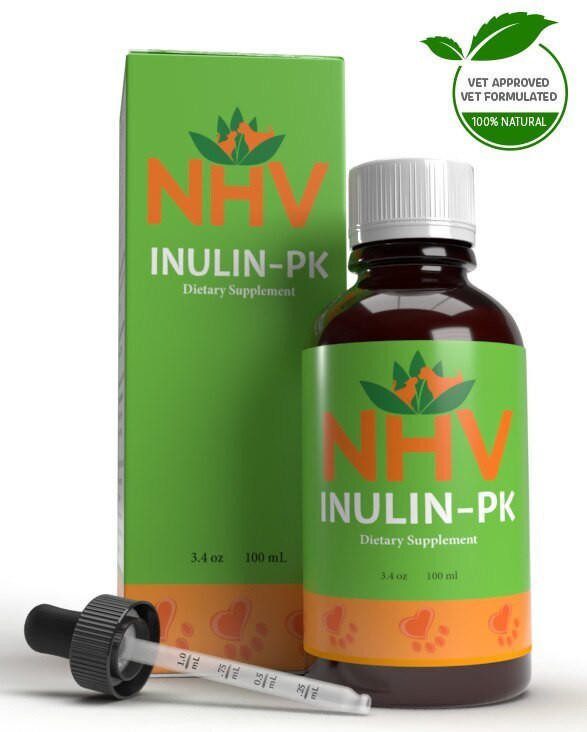
Natural Parasite Dewormer for Cats and Kittens
buy 2 and save $3
3 month supply for a small to medium size pet
Gently destroy parasite infestations with a natural cat dewormer while helping repair damage caused by worms and balancing the immune system.

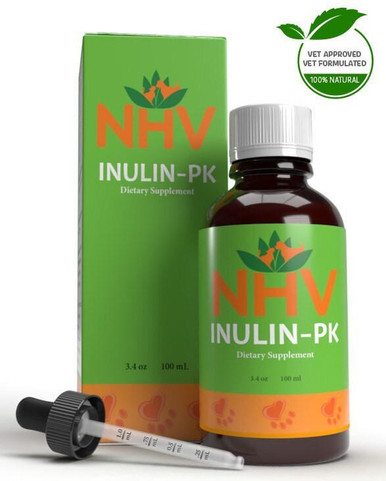
Gently destroy parasite infestations with a natural cat dewormer while helping repair damage caused by worms and balancing the immune system.

Rid your cat of internal parasites (worms) that can drain your pet’s energy, prevent them from absorbing nutrients from food, and damage the intestinal tract. Inulin PK is a natural cat dewormer designed to control parasites in cats, stop bleeding, and repair the internal damage worms cause.
Common types of worms that Inulin-PK can help support recovery from include hookworm, roundworm, whipworm, and tapeworm. The signs that your pet may be infected include anemia, weight loss, and diarrhea. We recommend first seeing your veterinarian for a diagnosis.
NHV supplements are all-natural herbal remedies that can be safely taken alongside conventional treatment.
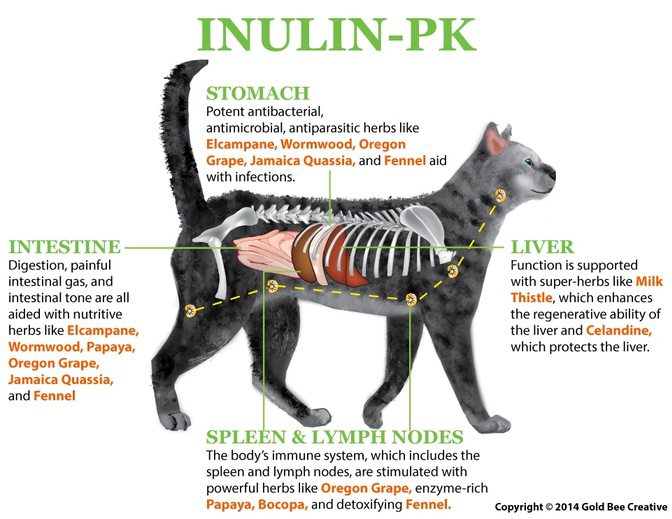
Elecampane – Has a paralyzing effect on the central nervous system of worms.
Wormwood – Expels intestinal worms and parasite infestations.
Jamaica Quassia – Helps expel parasitic worms from the body. Enhances other properties in Inulin PK.
Papaya – Helps dissolve the worm’s outer layer.
Oregon Grape – Helps relieve indigestion and malabsorption. It also has antibiotic and immunostimulatory properties.
Fennel – Relieves digestive problems and relaxes spasms.
Bacopa – Clears toxins, reduces inflammation, and improves healing.
Milk Thistle – Protects, strengthens, and stimulates new cell production in the liver.
Celandine – Protects the liver, improves bile flow, and helps to emulsify gallbladder content.
Select your pet's weight to determine the correct dose.
To be taken twice daily. Determine your pet’s weight and then use the easy chart below to determine the correct dose. This is the minimum dosage.
Pet's Weight Dosage
0 - 15 lb = 0.5 ml
16 - 30 lb = 1.0 ml
31 - 45 lb = 1.5 ml
46 - 60 lb = 2.0 ml
61 - 75 lb = 2.5 ml
Over 75 lb = 3.0 ml
How to Administer:
Shake well before use. The easiest method is to use the dropper provided and place the drops into your pet’s food or favorite treat. You can also use the dropper and squirt directly into the pet’s mouth. Some pets can be finicky, if this occurs consider hiding the drops in foods most pet’s love such as fish, chicken or yogurt or a favorite treat. If your pet only eats dry food then soak a few kibbles at feeding time.
For Best Results
Herbal dietary supplements are beneficial to the health and well-being of your pet and are safe for long-term use. Every pet responds to natural herbal supplements differently, therefore it is important to be consistent and administer the product daily. Supplements generally take two to four weeks to take effect, however this will vary from one animal to the next.
Product Storage
All NHV Natural Pet Products are pure herbal extracts and contain no artificial additives, preservatives or coloring. Shelf life after opening is 6 months and must be refrigerated after opening.
Cautions and Contraindications
Do not use Inulin PK in pregnant animals.
Speak to your vet before using our products. A second visit is recommended if your pet’s condition does not improve, or deteriorates after continued use of the supplements.
All information provided by NHV Natural Pet Products is for educational purposes only.
Rid your cat of internal parasites (worms) that can drain your pet’s energy, prevent them from absorbing nutrients from food, and damage the intestinal tract. Inulin PK is a natural cat dewormer designed to control parasites in cats, stop bleeding, and repair the internal damage worms cause.
Common types of worms that Inulin-PK can help support recovery from include hookworm, roundworm, whipworm, and tapeworm. The signs that your pet may be infected include anemia, weight loss, and diarrhea. We recommend first seeing your veterinarian for a diagnosis.
NHV supplements are all-natural herbal remedies that can be safely taken alongside conventional treatment.

Elecampane – Has a paralyzing effect on the central nervous system of worms.
Wormwood – Expels intestinal worms and parasite infestations.
Jamaica Quassia – Helps expel parasitic worms from the body. Enhances other properties in Inulin PK.
Papaya – Helps dissolve the worm’s outer layer.
Oregon Grape – Helps relieve indigestion and malabsorption. It also has antibiotic and immunostimulatory properties.
Fennel – Relieves digestive problems and relaxes spasms.
Bacopa – Clears toxins, reduces inflammation, and improves healing.
Milk Thistle – Protects, strengthens, and stimulates new cell production in the liver.
Celandine – Protects the liver, improves bile flow, and helps to emulsify gallbladder content.
Select your pet's weight to determine the correct dose.
To be taken twice daily. Determine your pet’s weight and then use the easy chart below to determine the correct dose. This is the minimum dosage.
Pet's Weight Dosage
0 - 15 lb = 0.5 ml
16 - 30 lb = 1.0 ml
31 - 45 lb = 1.5 ml
46 - 60 lb = 2.0 ml
61 - 75 lb = 2.5 ml
Over 75 lb = 3.0 ml
How to Administer:
Shake well before use. The easiest method is to use the dropper provided and place the drops into your pet’s food or favorite treat. You can also use the dropper and squirt directly into the pet’s mouth. Some pets can be finicky, if this occurs consider hiding the drops in foods most pet’s love such as fish, chicken or yogurt or a favorite treat. If your pet only eats dry food then soak a few kibbles at feeding time.
For Best Results
Herbal dietary supplements are beneficial to the health and well-being of your pet and are safe for long-term use. Every pet responds to natural herbal supplements differently, therefore it is important to be consistent and administer the product daily. Supplements generally take two to four weeks to take effect, however this will vary from one animal to the next.
Product Storage
All NHV Natural Pet Products are pure herbal extracts and contain no artificial additives, preservatives or coloring. Shelf life after opening is 6 months and must be refrigerated after opening.
Cautions and Contraindications
Do not use Inulin PK in pregnant animals.
Speak to your vet before using our products. A second visit is recommended if your pet’s condition does not improve, or deteriorates after continued use of the supplements.
All information provided by NHV Natural Pet Products is for educational purposes only.
Published: January 6, 2021